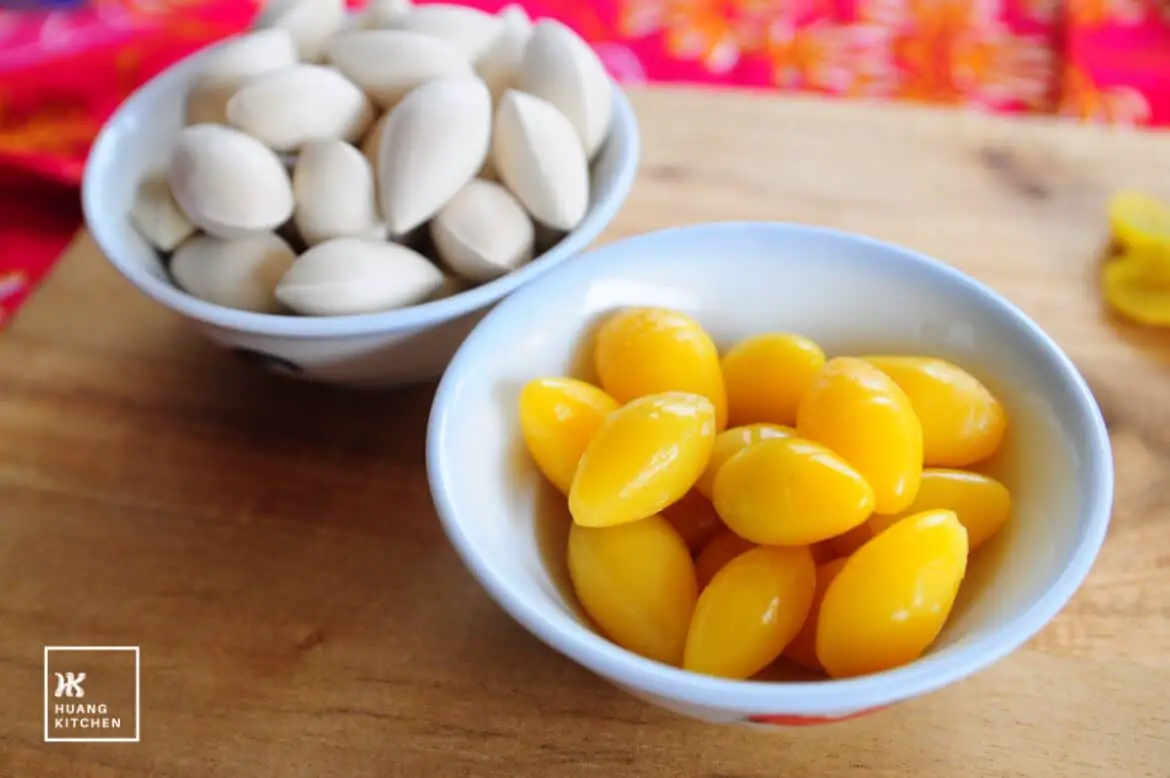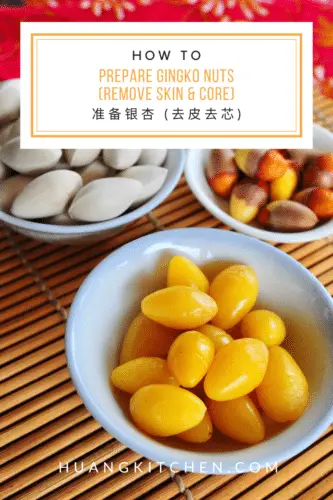Gingko Nuts (also known as Bai Guo 白果 or Ying Xin 银杏) is a popular ingredient used in many asian dishes. Preparing gingko for cooking is an important technique to learn, as doing it properly will save so much time and effort. Let’s learn how to do this!
Watch How To Prepare Gingko Nuts – Recipe Video
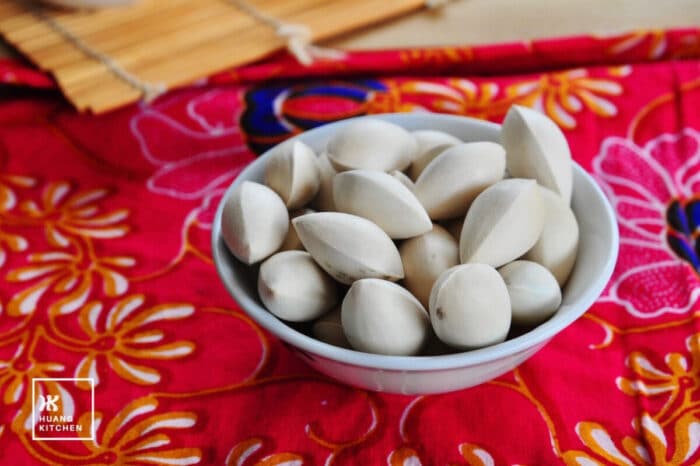
Ginkgo nuts are a type of food grown from the ginkgo biloba tree, a native Chinese plant (also known as 银杏). They are usually packaged and sold for culinary use. Ginkgo nuts are known as Ginnan (銀杏) in Japan and Bai Guo (白果) in China and are a popular snack for their chewy texture and nutty, bittersweet flavor. Besides, they are used to enrich and garnish sweet and savory dishes.
There are a few ways to prepare gingko nuts before cooking them. You can just gently break the nut shells with a small hammer, remove the hard outer shell, peel off the brownish skin membrane and remove the inner core which is the bitter part. However, you have to be careful not to smash too hard and it is extremely tedious to remove the inner brown skin using this method.
Another way is to pan fry washed gingko nuts for 5 minutes, cool and carefully break the nut shells to remove the hard cover as well as the brown skin. Otherwise you can also choose to boil the gingko nuts in water for a few minutes. (As shown in the video).
Then to remove the shell, hit gently with a hammer, rolling pin, or nutcracker. Blanch the shelled nuts for a minute and you can easily peel the paper-thin membrane and also to remove the inner core with your fingers. When cooked, ginkgo nuts turn a beautiful jade color.
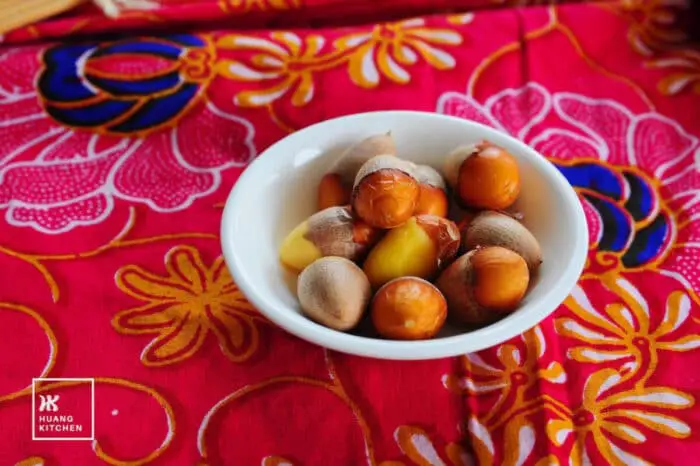
What is Gingko Nut?
Ginkgo nut is a small seed encased in a hard woody shell with an oval shape and tapered, broadly pointed ends. The ivory to cream-colored shell is thinner than a pistachio shell but is still hard and tough with a smooth texture. Underneath the shell is a brown layer of skin over the nut that needs to be removed before consumption. The nut ranges in color from jade green to golden amber and has a faint translucent nature.
Once cooked, the nuts have a dense and chewy texture reminiscent of chestnuts, edamame, or potatoes. Cooked ginkgo nuts have a subtly sweet to bitter flavor with a neutral, nutty taste. While gingko nuts are toxic raw, they can be consumed in small amounts once cooked, as they can cause poisoning if taken in large quantity.
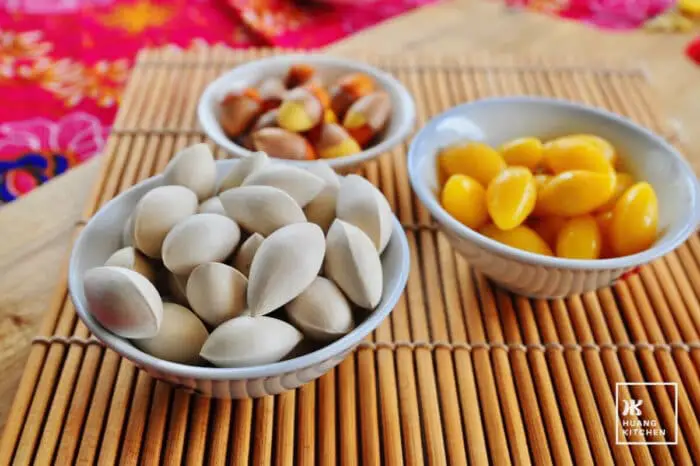
Ingredients Needed To Prepare This
- Gingko Nuts
- Water
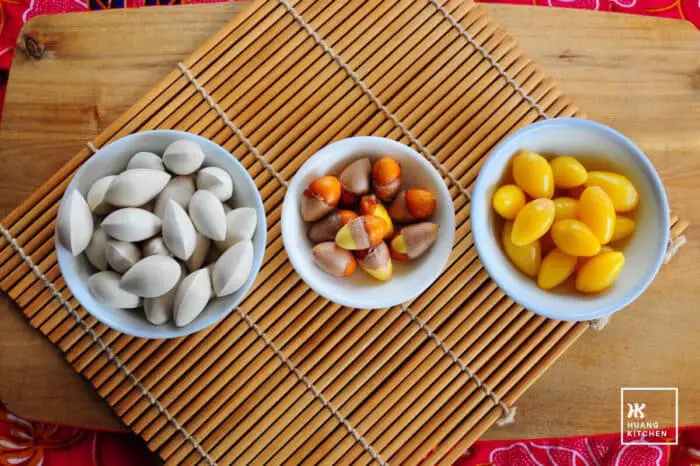
How to Prepare Gingko Nuts For Use
- Boil fresh gingko nuts in water for a few minutes.
- Using a small hammer or nut cracker, break the gingko shells and remove the hard outer covering.
- Blanch the shelled gingko nuts for a few minutes, cooled and gently peel to remove the brown membrane.
- Then remove the centre bitter core by using a toothpick to prick through the gingko nuts. Or cut the gingko nuts into halves from the bottom and remove the centre core.
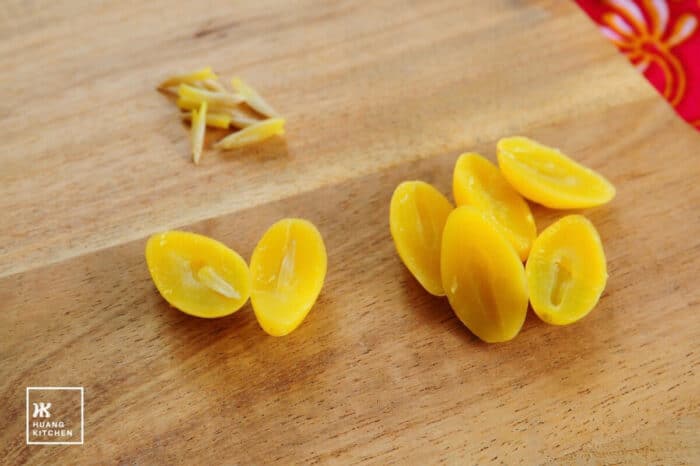
How To Serve Gingko Nuts
The gingko nuts need to be cooked before you can eat them. Cooked gingko nuts should be tender but not mushy. They can be eaten as snacks, in sweet and savory desserts or in soups.
Try one of these gingko nuts recipe:
Sweet Glutinous Rice Balls with Gingko Nuts (Tang Yuan) 杏仁糖汤圆
Chinese Yam With Gingko Soup 淮山白果汤
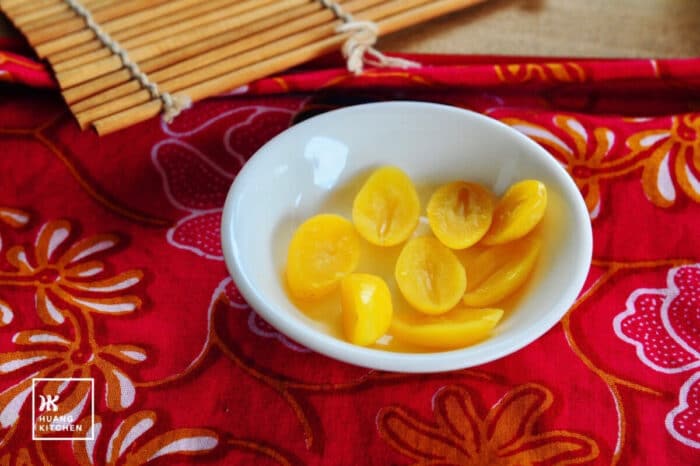
How To Store Peeled Gingko Nuts
Rinse the nuts well and put them on a cookie sheet. Put them in the oven to dry at 80 degrees Celsius for 30 to 60 min. They are ready when the white shells are dry. You can store them in an airtight jar for months. You can also freeze them after roasting for later use.
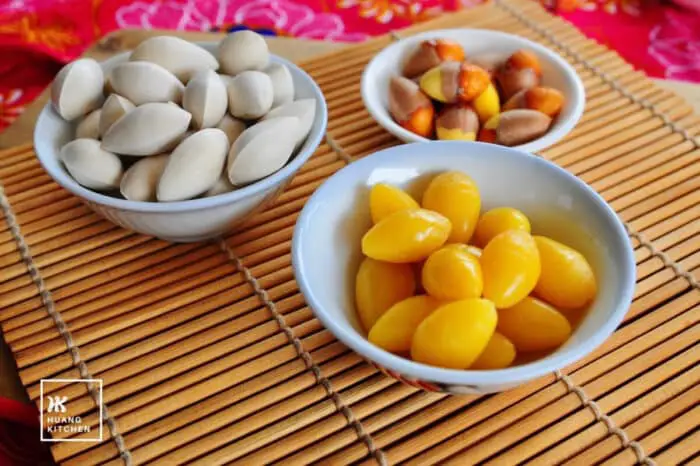
Important Tips To Prepare Gingko Nuts
- Choose gingko nuts that are fairly heavy for their size.
- It is recommend to use fresh nut which are mild and grassy—as opposed to canned ones, which taste waterlogged and tinny.
- To remove the shell, be sure to hit gently with a hammer or a stone pestle or press gently with a nutcracker.
- To make gingko nuts easier to peel, blanch them in simmering water for a minute.
- Store gingko nuts in a tightly sealed container, away from heat and humidity.
How To Prepare Gingko Nuts 银杏白果去皮去芯
Tap or Hover to Adjust Servings
Equipment
- 1 Nut Cracker
Ingredients
Ingredients:
- 100 grams gingko nuts
- 750 ml water
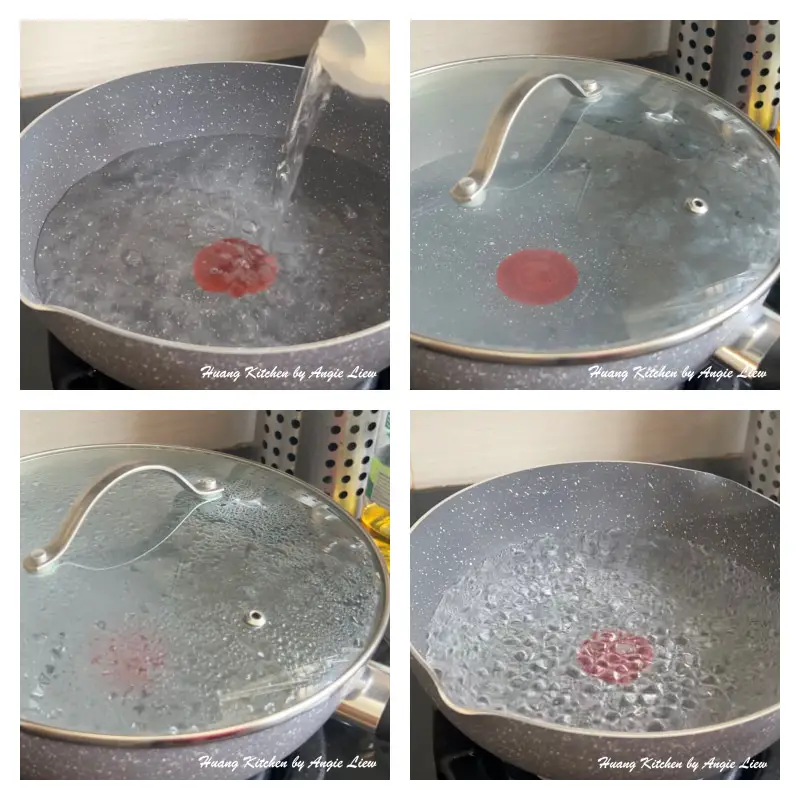 Add water in a pan. Cover and bring to a boil.
Add water in a pan. Cover and bring to a boil.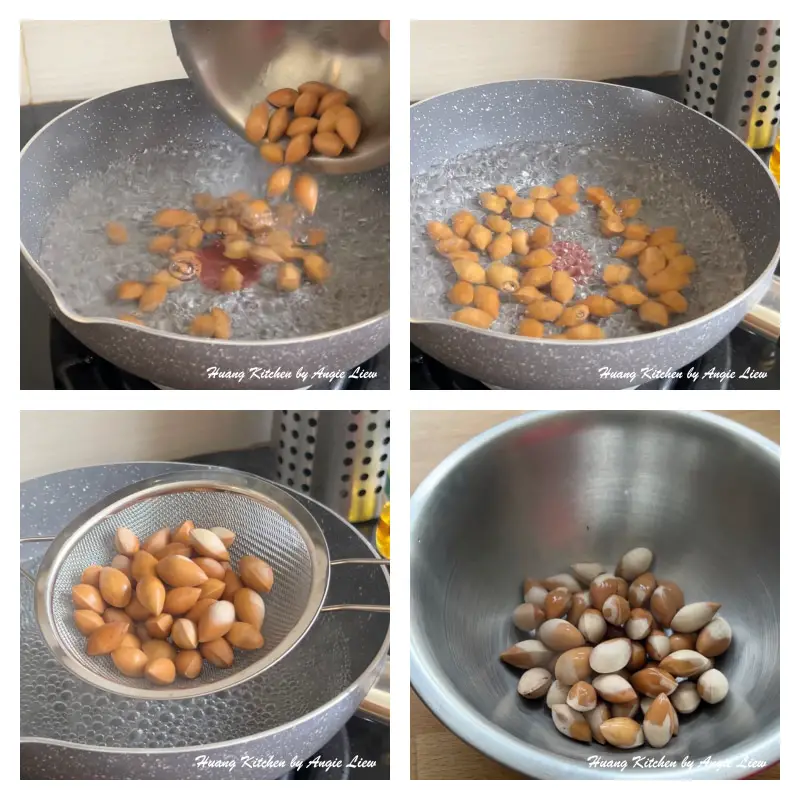 Add in washed gingko nuts. Stir to mix and allow to boil for 5 minutes. This will make the gingko flesh firmer. Then drain and remove from pan and leave to cool.
Add in washed gingko nuts. Stir to mix and allow to boil for 5 minutes. This will make the gingko flesh firmer. Then drain and remove from pan and leave to cool.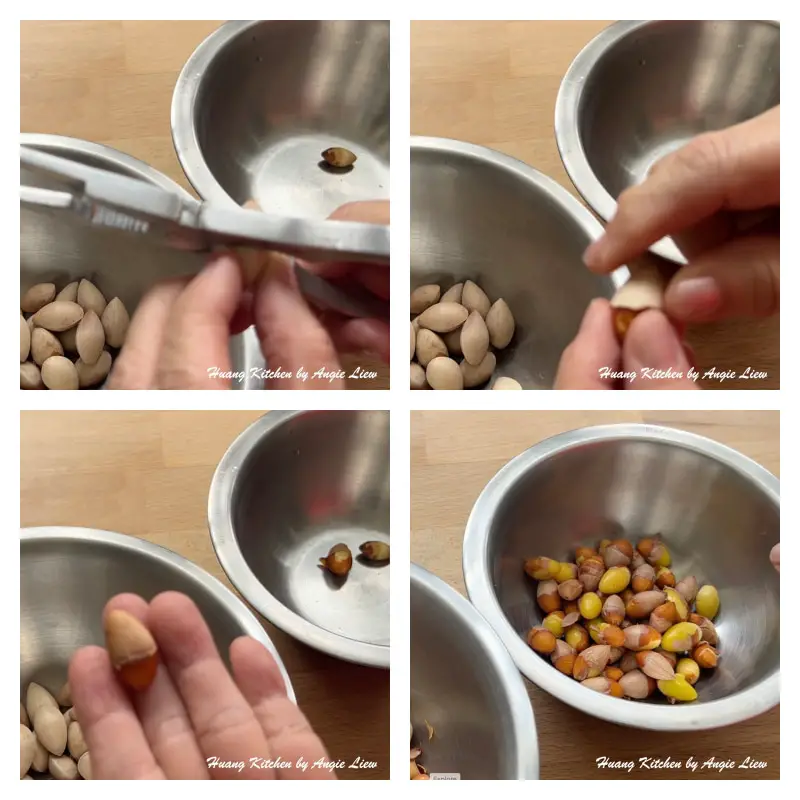 Then use a nut cracker to break the gingko shell. Look for the sharp corners and line on the gingko nuts. Gently press using the nut cracker to break the shell. Remove the shell once done. Repeat for all the gingko nuts.
Then use a nut cracker to break the gingko shell. Look for the sharp corners and line on the gingko nuts. Gently press using the nut cracker to break the shell. Remove the shell once done. Repeat for all the gingko nuts.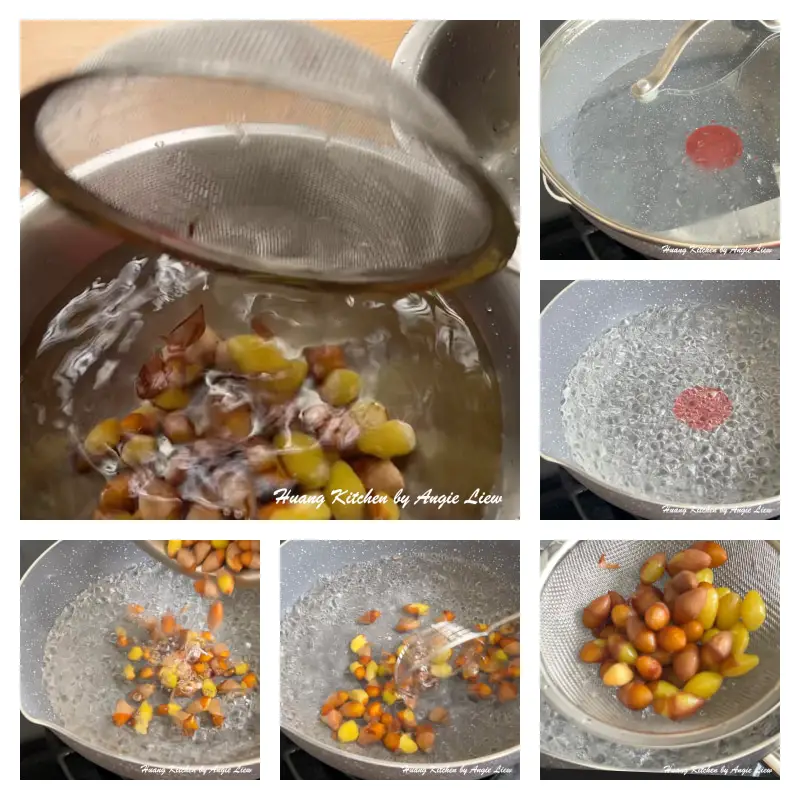 Bring water to boil again and add the shelled gingko nuts. Blanch the gingko nuts for about 5 minutes. Stir to even out the heat. Drain the gingko nuts and transfer into a bowl of cold water.
Bring water to boil again and add the shelled gingko nuts. Blanch the gingko nuts for about 5 minutes. Stir to even out the heat. Drain the gingko nuts and transfer into a bowl of cold water.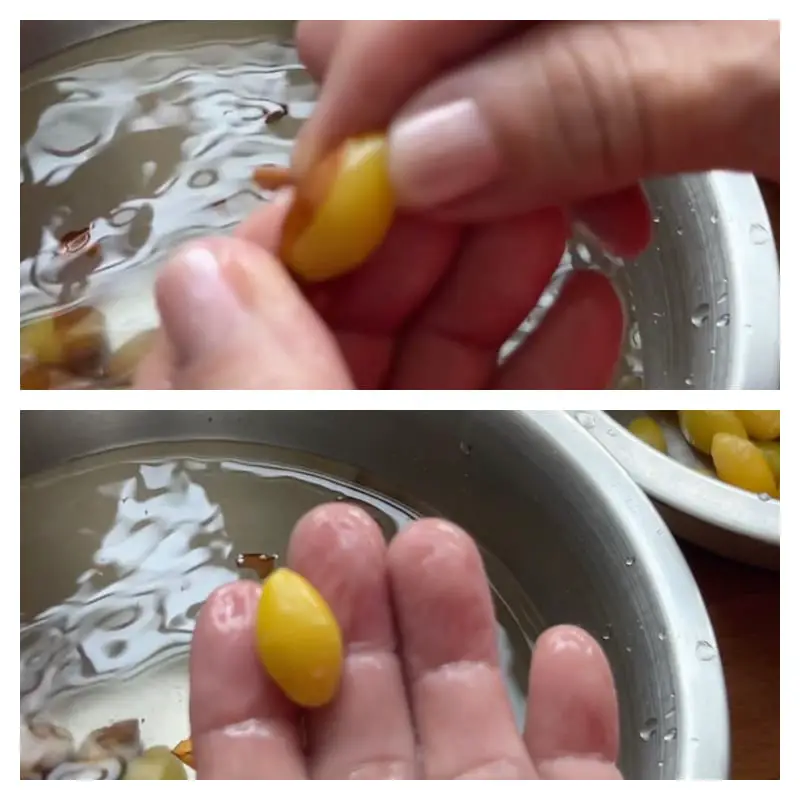 Peel to remove the paper-thin brown skin membrane with your fingers. Repeat for all the blanched gingko nuts.
Peel to remove the paper-thin brown skin membrane with your fingers. Repeat for all the blanched gingko nuts.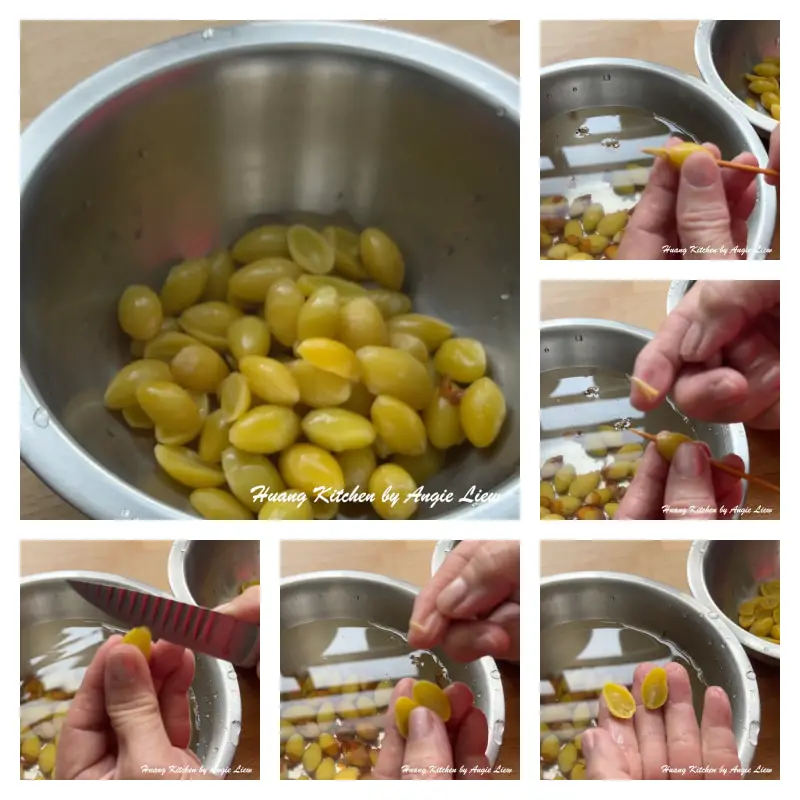 Use a toothpick to remove the centre bitter core of gingko nuts. You can also cut the gingko nuts in halves from the bottom and remove the centre core. And we are done.
Use a toothpick to remove the centre bitter core of gingko nuts. You can also cut the gingko nuts in halves from the bottom and remove the centre core. And we are done.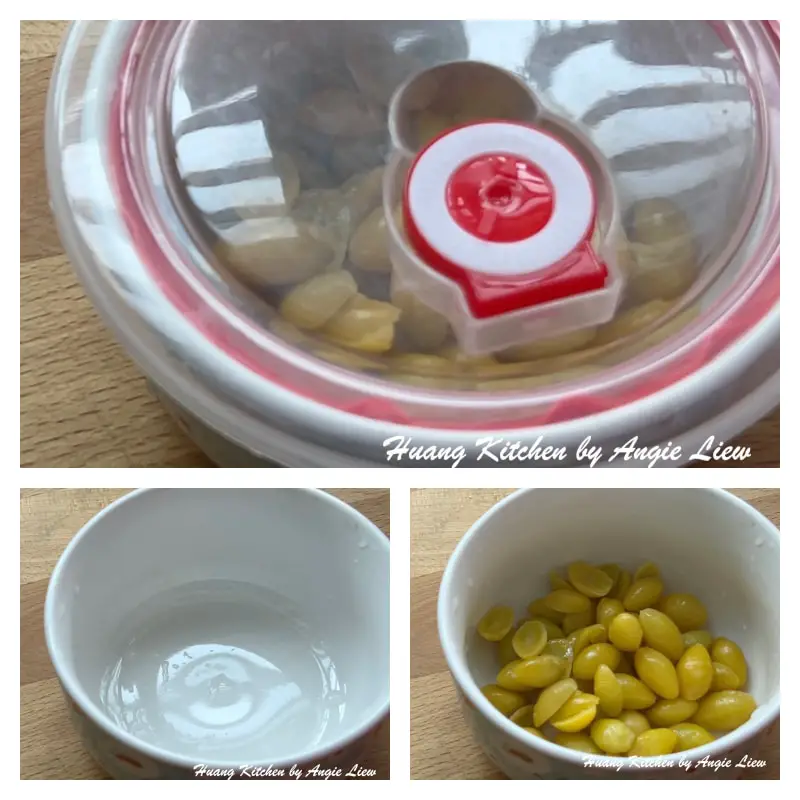 Store the gingko nuts in a clean and airtight container. You can freeze the shelled gingko nuts for later use. Can keep for up to one month.
Store the gingko nuts in a clean and airtight container. You can freeze the shelled gingko nuts for later use. Can keep for up to one month. Be sure to rinse and boil for a minute before use to remove the bitter taste.
Be sure to rinse and boil for a minute before use to remove the bitter taste.
Instructions
Remove Shell of Gingko Nuts:
Remove Brown Membrane of Gingko Nuts:
Enjoy!
Recipe Video
Notes
-
- Store fresh unshelled gingko nuts in th refrigerator
- Choose gingko nuts that are fairly heavy for their size.
- It is recommend to use fresh nut which are mild and grassy—as opposed to canned ones, which taste waterlogged and tinny.
- Store gingko nuts in a tightly sealed container, away from heat and humidity.
- To remove the shell, besides using a nutcracker, you can hit gently with a hammer or a stone pestle.

